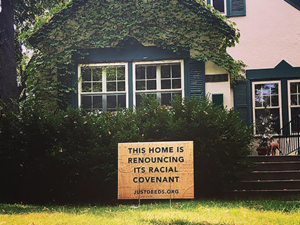
U.S. Sen. Tina Smith (D-Minn.) is seeking support for a bill she wrote which would provide grant money to organizations that help identify property deeds containing racist covenants. Some deeds written in the early 20th century contained provisions prohibiting the sale of land to Black people and other minorities. A team of researchers from the University of Minnesota has undertaken an ambitious project to identify deeds with racially restrictive covenants in major cities across the country. The legislation, which was introduced July 29, would make up to $50 million available over the next 10 years through the Department of Housing and Urban Development to assist with the project. Given that deeds are an essential part of the mortgage making process, bankers may find the effort to assess the impact of racist covenants worth studying.
The Wall Street Journal wrote a lengthy piece on the University of Minnesota project, “Mapping Prejudice.” Attracting well over 700 reader comments, the May 1 article was considered controversial by some people because it lacked a definitive explanation linking the decades-old language in the deeds with present-day homeownership patterns. The article noted that in Minneapolis, 77 percent of white residents own a home while only 25 percent of Black residents do. The newspaper said the disparity in Minneapolis is larger than in any other U.S. city.
The U.S. Supreme Court ruled in 1948 that such covenants are unenforceable. The Minnesota Legislature banned the covenants in 1953 and housing discrimination on the basis of race, religion and national origin was prohibited in 1962. Yet, many argue that the covenants still influence buying patterns. Homes on land with deeds containing such covenants are more likely to be owned today by whites. Writing about Sen. Smith’s proposed legislation, the Wall Street Journal says data from “Mapping Prejudice” show Minneapolis homes once subject to racist covenants are more valuable today than those that weren’t.
Some property owners today are working to amend their deeds, eliminating the racist provisions. In Minnesota and a few other states, a landowner can attach a separate addendum which affirms that racial covenants are illegal.
More research needs to be done to determine the impact of decades-old racist covenants on today’s patterns of homeownership. Perhaps Sen. Smith’s legislation could result in additional understanding.
This is an issue which may be of interest to bankers, particularly those in institutions which write mortgage loans. The deed is an essential document to the preparation of the mortgage. It might be worth keeping track, either formally or informally, of the number that contain racist covenants. If it is shown that racial covenants continue to influence land ownership patterns, some banks may consider actually getting involved in efforts to rewrite deeds related to mortgages they make.
